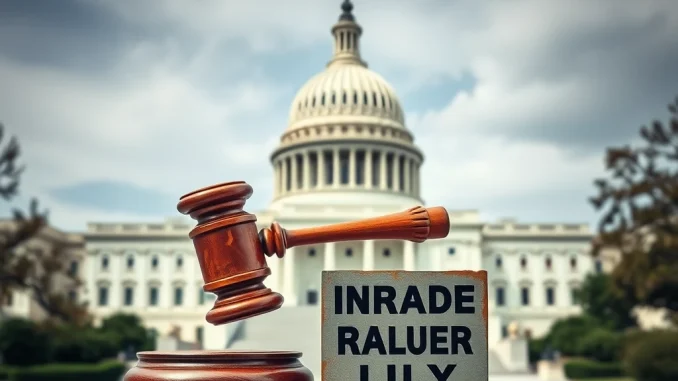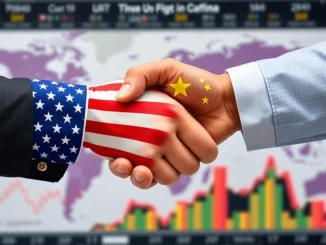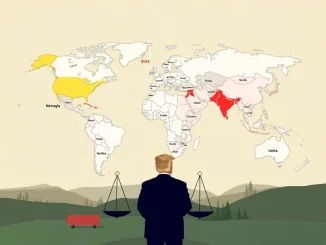
In a pivotal moment for international trade and economic policy, the U.S. Trade Representative has publicly stated that President Trump’s power to impose tariffs is not without boundaries. This revelation, delivered before the Ways & Means Committee on Capitol Hill, has sent ripples through global markets and sparked crucial discussions about the future of trade tariffs and the scope of presidential authority.
Why Does Tariff Authority Matter in Economic Policy?
Tariffs, essentially taxes on imported goods, are a powerful tool in a nation’s economic policy. They can be used to:
- Protect domestic industries: By making imported goods more expensive, tariffs can give local businesses a competitive edge.
- Generate revenue: Tariffs can be a source of income for the government.
- Negotiate trade agreements: The threat of tariffs can be used as leverage in international trade negotiations.
However, the application of tariff authority is a double-edged sword. While they might offer short-term benefits to specific sectors, they can also lead to:
- Increased costs for consumers: Tariffs raise the price of imported goods, which can be passed on to consumers.
- Retaliation from other countries: Imposing tariffs can provoke retaliatory measures from trading partners, leading to trade wars.
- Disruption to global supply chains: Tariffs can make it more expensive and complicated for businesses to source goods and materials internationally.

The U.S. Trade Representative’s Stance on Tariff Limits
Jamieson Greer, the U.S. Trade Representative, made a significant statement on Capitol Hill, clarifying that the President’s tariff authority is not absolute. This is noteworthy because:
- Checks and Balances: It underscores the principle of checks and balances within the U.S. government, even in matters of trade.
- Legal Framework: It suggests that there are legal and constitutional limits to presidential power in imposing tariffs.
- Predictability in Trade: This clarification can bring a degree of predictability to US trade relations, which is crucial for businesses and international partners.
Implications for Global Trade and the Economy
The U.S. is a major player in global trade, and its trade policies have far-reaching consequences. The acknowledgment of limits to tariff authority could mean:
- Reduced Trade Tensions: It may signal a move towards a more rules-based international trading system, potentially easing trade tensions with other nations.
- Stability for Businesses: Businesses engaged in international trade might find more stability and predictability in their operations, reducing the risk associated with sudden tariff changes.
- Impact on Market Sentiment: Such pronouncements can influence market sentiment, affecting investment decisions and potentially the valuation of various assets, including cryptocurrencies, which are often sensitive to macroeconomic developments and economic policy shifts.
Navigating the Complexities of US Trade Policy
Understanding US trade policy is essential for anyone involved in international business or watching the global economy. Here are a few key takeaways:
- Authority is Not Unlimited: Even presidential power has constraints, particularly in areas like trade, highlighting the importance of legal and institutional frameworks.
- Economic Impact: Trade policies, especially tariffs, have significant economic consequences that can ripple across industries and countries.
- Global Interconnectedness: The interconnected nature of the global trade system means that actions taken by one country can have global repercussions.
What’s Next for Tariff Authority and Economic Policy?
The statement from the U.S. Trade Representative opens up several questions:
- What are the specific limits? What exactly defines the boundaries of presidential tariff authority? This may lead to further legal and political discussions.
- How will this affect future trade negotiations? Will this clarification change the U.S.’s approach to trade negotiations and its use of tariffs as leverage?
- What is the global response? How will other countries react to this signal of potential restraint in U.S. tariff policy?
As the situation unfolds, it’s crucial to stay informed about developments in economic policy and global trade. These factors play a significant role in shaping the economic landscape and can indirectly influence various markets, including the cryptocurrency space.
In Conclusion: A Measured Approach to Trade Tariffs?
The U.S. Trade Representative’s statement serves as a critical reminder that even in the realm of trade tariffs, power is not absolute. This development introduces a layer of complexity and perhaps a degree of reassurance to the volatile world of international commerce. For businesses, investors, and global citizens alike, understanding the nuances of tariff authority and economic policy is becoming increasingly important in navigating an interconnected and ever-changing world. The acknowledgement of limits could pave the way for more predictable and stable US trade relations in the future, which is beneficial for the entire global trade ecosystem.



